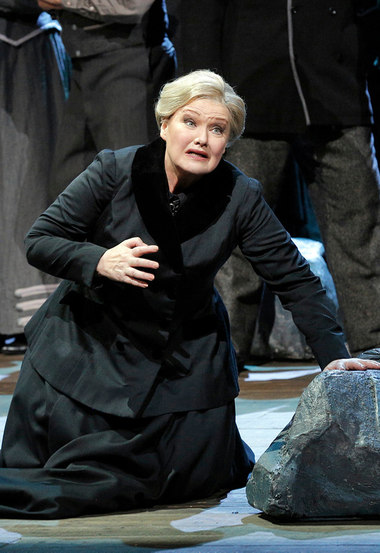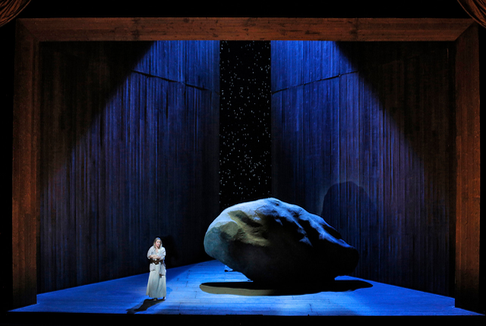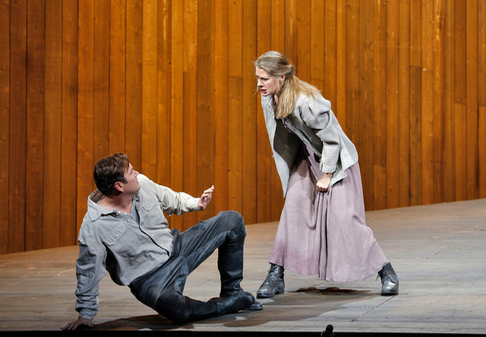Recently in Reviews
English Touring Opera are delighted to announce a season of lyric monodramas to tour nationally from October to December. The season features music for solo singer and piano by Argento, Britten, Tippett and Shostakovich with a bold and inventive approach to making opera during social distancing.
This tenth of ten Live from London concerts was in fact a recorded live performance from California. It was no less enjoyable for that, and it was also uplifting to learn that this wasn’t in fact the ‘last’ LfL event that we will be able to enjoy, courtesy of VOCES8 and their fellow vocal ensembles (more below …).
Ever since Wigmore Hall announced their superb series of autumn concerts, all streamed live and available free of charge, I’d been looking forward to this song recital by Ian Bostridge and Imogen Cooper.
The Sixteen continues its exploration of Henry Purcell’s Welcome Songs for Charles II. As with Robert King’s pioneering Purcell series begun over thirty years ago for Hyperion, Harry Christophers is recording two Welcome Songs per disc.
Although Stile Antico’s programme article for their Live from London recital introduced their selection from the many treasures of the English Renaissance in the context of the theological debates and upheavals of the Tudor and Elizabethan years, their performance was more evocative of private chamber music than of public liturgy.
In February this year, Albanian soprano Ermonela Jaho made a highly lauded debut recital at Wigmore Hall - a concert which both celebrated Opera Rara’s 50th anniversary and honoured the career of the Italian soprano Rosina Storchio (1872-1945), the star of verismo who created the title roles in Leoncavallo’s La bohème and Zazà, Mascagni’s Lodoletta and Puccini’s Madama Butterfly.
Evidently, face masks don’t stifle appreciative “Bravo!”s. And, reducing audience numbers doesn’t lower the volume of such acclamations. For, the audience at Wigmore Hall gave soprano Elizabeth Llewellyn and pianist Simon Lepper a greatly deserved warm reception and hearty response following this lunchtime recital of late-Romantic song.
Collapsology. Or, perhaps we should use the French word ‘Collapsologie’ because this is a transdisciplinary idea pretty much advocated by a series of French theorists - and apparently, mostly French theorists. It in essence focuses on the imminent collapse of modern society and all its layers - a series of escalating crises on a global scale: environmental, economic, geopolitical, governmental; the list is extensive.
For this week’s Live from London vocal recital we moved from the home of VOCES8, St Anne and St Agnes in the City of London, to Kings Place, where The Sixteen - who have been associate artists at the venue for some time - presented a programme of music and words bound together by the theme of ‘reflection’.
'Such is your divine Disposation that both you excellently understand, and royally entertaine the Exercise of Musicke.’
Amongst an avalanche of new Mahler recordings appearing at the moment (Das Lied von der Erde seems to be the most favoured, with three) this 1991 Mahler Second from the 2nd Kassel MahlerFest is one of the more interesting releases.
‘And there was war in heaven: Michael and his angels fought against the dragon; and the dragon fought and his angels, And prevailed not; neither was their place found any more in heaven … that old serpent … Satan, which deceiveth the whole world: he was cast out into the earth, and his angels were cast out with him.’
If there is one myth, it seems believed by some people today, that probably needs shattering it is that post-war recordings or performances of Wagner operas were always of exceptional quality. This 1949 Hamburg Tristan und Isolde is one of those recordings - though quite who is to blame for its many problems takes quite some unearthing.
There was never any doubt that the fifth of the twelve Met Stars Live in Concert broadcasts was going to be a palpably intense and vivid event, as well as a musically stunning and theatrically enervating experience.
‘Love’ was the theme for this Live from London performance by Apollo5. Given the complexity and diversity of that human emotion, and Apollo5’s reputation for versatility and diverse repertoire, ranging from Renaissance choral music to jazz, from contemporary classical works to popular song, it was no surprise that their programme spanned 500 years and several musical styles.
The Academy of St Martin in the Fields have titled their autumn series of eight concerts - which are taking place at 5pm and 7.30pm on two Saturdays each month at their home venue in Trafalgar Square, and being filmed for streaming the following Thursday - ‘re:connect’.
The London Symphony Orchestra opened their Autumn 2020 season with a homage to Oliver Knussen, who died at the age of 66 in July 2018. The programme traced a national musical lineage through the twentieth century, from Britten to Knussen, on to Mark-Anthony Turnage, and entwining the LSO and Rattle too.
With the Live from London digital vocal festival entering the second half of the series, the festival’s host, VOCES8, returned to their home at St Annes and St Agnes in the City of London to present a sequence of ‘Choral Dances’ - vocal music inspired by dance, embracing diverse genres from the Renaissance madrigal to swing jazz.
Just a few unison string wriggles from the opening of Mozart’s overture to Le nozze di Figaro are enough to make any opera-lover perch on the edge of their seat, in excited anticipation of the drama in music to come, so there could be no other curtain-raiser for this Gala Concert at the Royal Opera House, the latest instalment from ‘their House’ to ‘our houses’.
"Before the ending of the day, creator of all things, we pray that, with your accustomed mercy, you may watch over us."
Reviews

21 Jun 2016
Jenůfa in San Francisco
The early summer San Francisco Opera season has the feel of a classy festival. There is an introduction of Spanish director Calixto Bieito to American audiences, a five-act Don Carlo and two awaited, inevitable role debuts, Karita Mattila as Kostelnička and Malin Bystrom as Janacek's Jenůfa.
Swedish soprano Malin Bystrom (the Mozart heroines in Salzburg and at the Met and Covent Garden) was born to be Janáček's melodramatic heroine. A lithe, youthful presence with a voice of sufficient importance to make us revel in this squalid, brutal tale of a primitive social world. As well her voice possesses a primal purity and innocence that reassures us finally of the beauties possible in the human psyche. The Bystrom Jenůfa was at once the fallen woman and the redeemed soul, her redemption a simple acceptance and understanding of human love.
Some twenty years ago this was the Jenůfa of Karita Mattila as well. No longer willing to portray the guilty innocence of an operatic adolescent this extraordinary diva has transformed herself into Jenůfa's stepmother Kostelnička, a mature woman driven by powerful social forces and overwhelmed by a selfish form of maternal love. Mattila fans (and that is nearly everyone) have eagerly awaited the Mattila take on this complex and emotionally demanding role.
Mattila’s transition from daughter to mother however has not been fully effected in San Francisco. While there is no question that la Mattila projected the persona of great force that this role requires we see that sheer force of personality alone cannot explain and does not explore the subtlety and cunning of this conflicted human creature.
Subtlety and cunning are indeed ripe in Janáček’s adaptation of The Stepmother’s Daughter (the play on which Jenůfa is based and in fact the Czech title of the opera) and in Janáček’s musical score every germ of thought and action is detailed, and the motivations are nervous, brutal, direct and honest interspersed with moments of understanding that are luminous. The story builds to a shattering climax and final minutes (not moments) of revelation that can attain the sublime.
 Malin Byström as Jenufa
Malin Byström as Jenufa
Czech maestro Jiří Bělohlávek took a symphonic approach to the score that integrated Janáček's maelstrom of thought fragments into larger musical shapes. This larger wash, a somewhat dreamlike emotional force, robbed Janáček's characters of the psychic minutiae that informed their actions, leaving us in an unexplained emotional wake. We missed the bursts of revelation as they were absorbed into this larger and indeed far more delicate thrust. From the first moment conductor Bělohlávek left us no where to go, and no place to land.
A similar approach was taken by French stage director Olivier Tambossi when he conceived his Jenůfa production (1998). He abstracted the minutiae of Janáček’s primitive peasant world into one primary image — a boulder (a metaphor for emotional weight mentioned in Act II). Like conductor Bělohlávek he suppressed the particulars of the world of Kostelnička, leaving us in its emotional wake — a priori he interpreted Kostelnička’s world for us by reducing it to this one image. We had nothing to discover, we were simply told. By-the-way the stone looked a lot like a huge potato. It was confusing.
 Scott Quinn as Steva, Malin Byström as Jenufa
Scott Quinn as Steva, Malin Byström as Jenufa
Of somewhat lesser scale than the two divas were the performances by William Burden as Laca and Scott Quinn as Steva. Both young men impressively created Janacek's troubled young men, both are very fine singers and excellent actors. Such talent begs a production that does not rely solely on force of personality.
Though a victim of the heavy-handed direction Grandmother Burjovka was ably portrayed by Jill Grove.
As usual the Adler Fellows assumed many minor roles. Soprano Julie Adams was an appropriate Karolka and baritone Matthew Stump made an almost believable Foreman-at-the-Mill. The fresh voices of the Adlers are always a great pleasure to hear and admire. These young singers are too often called upon to portray characters that have nothing to do with their age, personalities, or quality of voice.
Michael Milenski
Casts and production information:
Jenůfa: Malin Byström; Kostelnička: Karita Mattila; Laca Klemeň: William Burden; Steva Buryja: Scott Quinn; Grandmother Buryjovka: Jill Grove; Foreman at the Mill: Matthew Stump; Mayor of the Village: Anthony Reed; Karolka: Julie Adams; Barena: Toni Marie Palmertree; The Mayor's Wife: Zanda Svëde; The Maid: Laura Krumm; Jano: Sarah Tucker. Chorus and Orchestra of the San Francisco Opera. Conductor:Jiří Bělohlávek; Director: Olivier Tambosi; Production Designer: Frank Philipp Schlössmann; Lighting Designer: Gary Marder. War Memorial Opera House, San Francisco, June 14, 2016.


